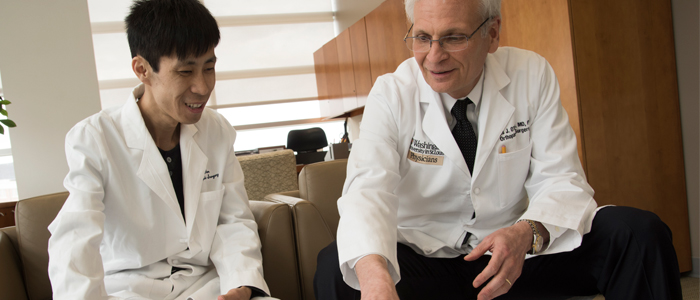- Home
- Research
- Achieving Excellence - Research at Washington University Orthopedics
- Orthopaedic Achievements
Orthopaedic Achievements through Patient Care, Education and Research

Jie Shen, PhD, (left) instructor in orthopaedic surgery, discusses research into musculoskeletal cancer with Regis J. O’Keefe, MD, PhD, Chair of Washington University Orthopedics. (Credit: Bob Boston)
At Washington University School of Medicine, we believe innovation and groundbreaking improvements in patient outcomes begin with a strong foundation in relevant orthopedic research.
Since the Department of Orthopaedic Surgery was established 22 years ago — and even in the early years of orthopedics as far back as the early 1900s — the mission has always been to advance the field of orthopedics in a way that enhances patient care and clinical practices as well as impacts the training of the next generation of orthopedic specialists.
In every single orthopedic subspecialty, we have advanced and are advancing the course of orthopedic care. From basic science — investigations to better understand the cellular pathways and genetic mechanisms that trigger osteoarthritis or to bioengineer new cartilage — to clinical research efforts that are identifying new and better surgical procedures, we are consistently at the forefront of excellence in orthopedics.
Because of our strong focus on research, the Department of Orthopaedic Surgery has been ranked #1 in orthopedic research funding from the National Institutes of Health (NIH) every year except for one since 2009. Significantly, despite the fact that the NIH budget has been virtually flat for the past six years, the amount of research dollars awarded to our researchers has increased by 47 percent since 2010. We also have more than doubled the number of peer-reviewed research articles (from 93 to 208) published annually within the same time frame.
Our Research Priorities
With NIH funding continuously eroding, making significant research funds difficult to obtain, we want to create a vibrant research environment so that all can keep achieving excellence in orthopedics. With strong leadership and support we want to:
- Design materials, therapeutics, surgical treatments, devices and more that will accelerate and improve the pace of understanding of orthopedic diseases and care.
- Foster critical thinking skills and expose orthopedic trainees to research early in their careers so they develop a fundamental desire to make a contribution to our overall field.
- Support our trainees and junior faculty so that they can achieve and succeed in their research efforts
Mentoring and Collaboration
To assist with these challenges, we have defined mentoring programs for residents, fellows and junior faculty. Every division has biweekly or monthly research meetings. For clinical investigators, we support our trainees and faculty who pursue an additional Master of Science in Clinical Investigation degree. By May 2017, the department will have had 11 MSCI graduates in its program since 2012. This means there will be an entire cohort of orthopaedic specialists who have a deeper understanding and respect for research. For those who pursue knowledge in basic science initiatives, we are part of a large multidisciplinary and collaborative Musculoskeletal Research Center that includes scientists from multiple departments who are pursuing questions related to the triggers and processes of musculoskeletal diseases.
Innovative Programs
In 2016-2017, the Department debuted several exciting initiatives that enhance our overall research environment:
- Orthopedic Clinical Research Center — Similar to the Musculoskeletal Research Center, we have brought all faculty and staff focused on clinical research in our department together into a single dynamic and collaborative research center to better enable them to share resources, spark conversations and accelerate the speed at which they translate research into actual patient care advancements.
- Leadership for Achievement – To maintain a sharp focus on our mission to advance the field of orthopedics, we have brought our entire leadership team together for formal discussions so that we can continue to enhance collaborative strengths and identify new ways to achieve.
- NIH PROMIS Initiative — We are one of the first orthopedic departments in the country — and one of only a few to achieve 95 percent patient participation — in implementing NIH’s Patient-Reported Outcomes Measurement Information System, or PROMIS. This nationwide initiative uses a complex algorithm and patient questionnaires to hone in on how factors such as lifestyle choices, obesity, exercise and mental health impact the progression of diseases or the outcome of various treatment options.
At Washington University School of Medicine, there are numerous examples of how we create the environment and opportunity to achieve excellence in clinical care, education, research and academic activities. Take a moment and review some of our more recent groundbreaking and relevant investigations in basic, translational and clinical research.
We set the bar higher because we want to achieve excellence in orthopedics. To make a difference, we will always be probing and questioning, with the idea that we can continuously improve and redefine who we are and how we care for orthopedic patients here — and around the world.
Next article: Juvenile Inflammatory Arthritis